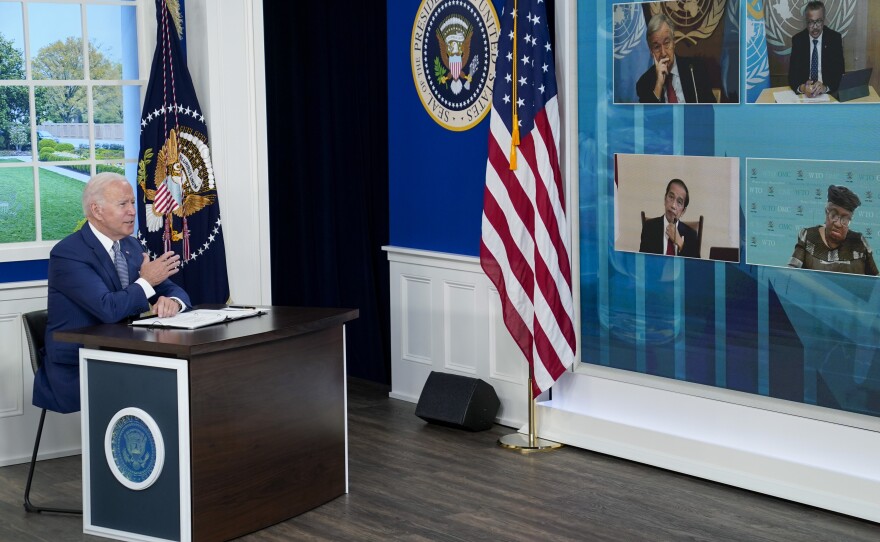What does the world need to do to help countries recover from the pandemic?
We asked global health experts to weigh in as governments and members of the public and private sector convene on May 12 for the second Global COVID-19 Summit, a virtual event hosted by the White House. The event will be livestreamed to the public at 9 a.m. ET.
The aim of the summit include finding ways to vaccinate the world – only about 16% of people in low-income countries have received at least one dose — protect the most vulnerable people from COVID and prepare for the next pandemic.
Here are five ideas that may or may not come up at the big conference – but that experts we spoke to think are critical.
Put African countries in the driver's seat
Oyeronke Oyebanji, an Aspen New Voices Fellow from Nigeria and vaccine research and development strategy coordinator at the Coalition for Epidemic Preparedness Innovations
Thanks to high vaccination coverage, access to new antivirals and in some cases low hospitalization rates, many high-income countries have completely lifted their COVID-19 public health and social measures, such as use of masks and mandatory travel tests. Sadly, many African countries continue to grapple with the challenges faced in the early phases of the pandemic – limited access to personal protective equipment for health-care workers, diagnostics and therapeutics. Although vaccines are now available, the capacity to distribute and deliver these vaccines remains limited.
Over the next few months, African countries must be urgently prioritized and supported in dealing with these challenges. The continued risk of emergence and spread of variants makes this even more urgent. The inequity that still exists is simply unacceptable.
The true solutions to Africa's challenges lie in developing capabilities within the region, led by Africans and supported by the world.
Pay all health workers – and invest in 'test and treat' programs
Fifa Rahman, a civil society representative on the World Health Organization's Access to COVID-19 Tools Accelerator program who is based in the U.K.
There are health workers in Africa who are not medically trained but who really know how to reach their peers in their communities and how to deploy health services. Unfortunately their payments are not stable. In fact, according to a 2020 study from the Center for Global Development, only 14% of Africa's 916,000 active community health workers are salaried, while the remaining CHWs are volunteers with some or no compensation.
They are doing such important work in the pandemic. They reach out to older people and bring them to vaccination centers. They deploy rapid antigen tests and get people tested in communities. And they do other work on diseases such as HIV, TB and malaria.
It is essential that these workers draw regular salaries and that they are fully and meaningfully engaged in their domestic COVID responses. Many on the international scene are concerned about poor vaccine uptake but aren't willing to invest in community health systems.
In addition, there are many countries that remain poorly vaccinated — some that haven't fully vaccinated even 5% of their population, [such as Madagascar, Papua New Guinea and Yemen]. To help protect the unvaccinated in these countries, world leaders should focus on investing in "test and treat" programs, which allow for people to self-test at home or at their local health care facility and enable them to access newer treatments, such as Paxlovid [a drug that can help patients recover from mild to moderate cases of COVID].
Give a major makeover to foreign aid
Rodrigo Bazúa Lobato, a Aspen New Voices Fellow from Mexico and doctoral student at the Harvard Chan School of Public Health.
The second COVID-19 summit comes at a crucial moment when most of the world is going back to business as usual. What should not go back to business as usual is the way foreign aid works.
Currently, funders such as USAID, the Global Fund and the Bill & Melinda Gates Foundation [a funder of NPR and this blog] provide aid to countries in an uncoordinated manner. Each one of the funders has their own priorities for countries in desperate need of these funds – but these countries often have different priorities.
In addition, aid institutions often hire consultants and import equipment and goods from their own countries [for their aid programs], ignoring the capacity already present in recipient countries.
If the U.S. and high-income countries want to help lower- and middle-income countries increase their capacity to respond effectively to surges of COVID-19 and other public health threats, they need to stop funding their domestic aid industries and instead give those funds to local [aid organizations and] experts.
Don't just provide the vaccines
Nina Schwalbe, adjunct assistant professor of Population and Family Health, Columbia University Mailman School of Public Health
The U.S. has purchased over 1 billion doses of vaccines for COVAX, the global vaccine-sharing program. While this is a generous contribution, it is not enough. Vaccination requires vaccines and delivery. In order for that contribution not to be wasted, the U.S. also has to support last-mile delivery so we can get vaccines to people who need them. It's sort of like giving people a car without also providing the gasoline. The car can't run.
Kamala Thiagarajan is a freelance journalist based in Madurai, Southern India. She reports on global health, science, and development, and her work has been published in the New York Times, The British Medical Journal, BBC, The Guardian and other outlets. You can find her on twitter @kamal_t
Copyright 2022 NPR. To see more, visit https://www.npr.org. 9(MDAzMjM2NDYzMDEyMzc1Njk5NjAxNzY3OQ001))






